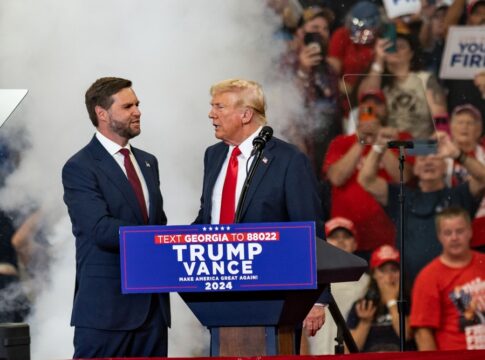The diplomatic rift between Ukrainian President Volodymyr Zelenskyy and U.S. Vice President JD Vance has escalated following Zelenskyy’s controversial appearance on 60 Minutes. Zelenskyy accused American leadership of spreading Russian disinformation and specifically targeted Vance for allegedly justifying Putin’s actions in Ukraine. Is there merit to Vance’s claim that Ukraine needs to pursue more diplomatic solutions?
The 60 Minutes Interview That Ignited Controversy
Ukrainian President Volodymyr Zelenskyy sparked a diplomatic firestorm during his recent appearance on CBS’s 60 Minutes, where he made several pointed accusations against the Trump administration. The Ukrainian leader claimed that “Russian narratives are prevailing in the U.S.” and specifically targeted Vice President JD Vance for allegedly spreading Russian propaganda.
Zelenskyy went further by suggesting that President Trump should visit Ukraine before discussing any peace deals, seemingly placing conditions on diplomatic efforts. His comments represented a direct challenge to the administration that has provided billions in military and financial support to his embattled nation.
JD Vance Goes Off on Zelenskyy After Ukrainian President Launches a Nasty Cheap Shot Against Him on 60 Minutes
READ: https://t.co/fTHXtNqUh5 pic.twitter.com/xu8o9RU8Dr
— The Gateway Pundit (@gatewaypundit) April 15, 2025
Vance’s Strong Rebuke and Defense of U.S. Support
Vice President Vance did not let Zelenskyy’s accusations go unanswered, delivering a forceful response in an interview with Unherd. “I think it’s sort of absurd for Zelenskyy to tell the government, which is currently keeping his entire government and war effort together, that we are somehow on the side of the Russians,” Vance stated, clearly frustrated by what he viewed as ungrateful behavior.
Vance further emphasized the importance of understanding both Russian and Ukrainian strategic goals to effectively resolve the conflict. He argued that recognizing the perspectives of both sides does not constitute support for Putin’s actions but represents necessary diplomatic realism.
🚨JD Vance goes BEAST-MODE on Zelenskyy trying to sabotage a Trump Peace deal:
“His country wouldn’t exist without the generosity of the United States of America. Say thank you. It’s stupid. Badmouthing Trump in public will not change his mind. Zelenskyy needs better consultants pic.twitter.com/96yzVIYKYn
— Benny Johnson (@bennyjohnson) February 20, 2025
The White House Confrontation That Revealed Deeper Tensions
The tensions between Zelenskyy and the Trump administration weren’t born from the 60 Minutes interview alone but date back to a contentious White House meeting. During that visit, discussions reportedly broke down when Vance and Trump pressed Zelenskyy on diplomatic solutions to end the war.
Vance revealed that the meeting “went off the rails” when he told Zelenskyy, “I’m talking about the kind of diplomacy that’s going to end the destruction of your country.” This exchange highlighted the fundamental disagreement between the Trump administration’s push for negotiated peace and Zelenskyy’s apparent reluctance to pursue diplomatic solutions that might involve territorial concessions.
Vance also criticized Zelenskyy’s approach to the war, particularly the conscription policies sending Ukrainian citizens to the front lines. The Vice President questioned whether Ukraine’s strategy was sustainable given the human cost and limited resources, suggesting that diplomatic solutions should be prioritized over prolonged conflict.
The dispute reflects broader tensions within American politics regarding continued support for Ukraine. While the Trump administration has maintained aid to Ukraine, it has increasingly signaled a desire to see concrete diplomatic progress rather than open-ended military commitment.
As casualties mount on both sides and resources become increasingly strained, the public disagreement between Zelenskyy and Vance could have significant implications for the future of U.S.-Ukraine relations. The Trump administration appears to be signaling that while support will continue, it comes with an expectation of serious diplomatic engagement from Ukraine.
Both leaders face domestic pressures that shape their positions, with Zelenskyy needing to project strength to his war-weary population and Vance representing an administration that has promised a more pragmatic approach to foreign entanglements. This diplomatic friction occurs against the backdrop of a brutal conflict that continues to exact a heavy toll on Ukraine and its people.


